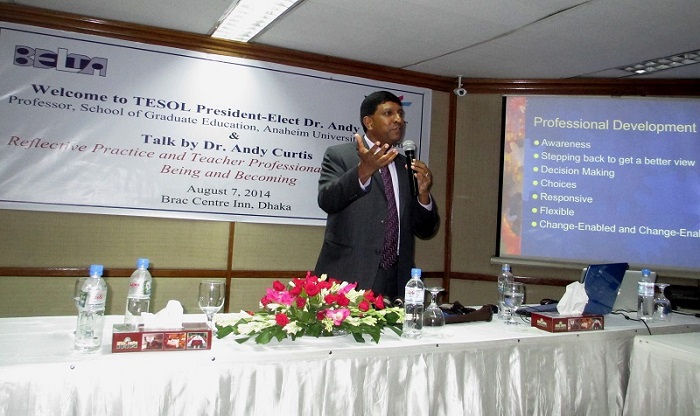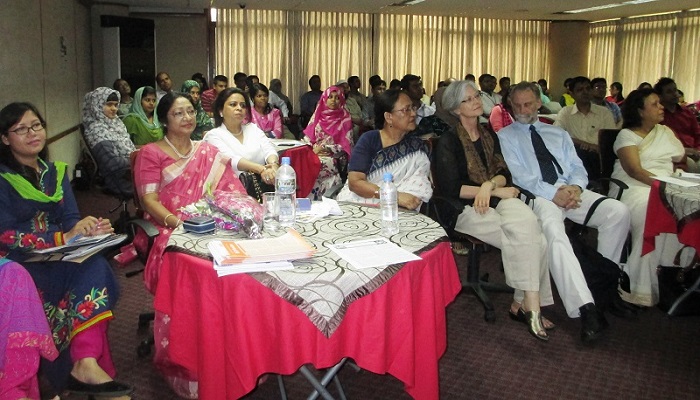|
TESOL
President Andy Curtis (while he was President Elect) visited Bangladesh in August 2014. He was there as the invited Keynote
Speaker at the University of Liberal Arts’ 2nd International ELT
Conference. Andy’s wife Liying Cheng accompanied him and was herself a plenary
speaker on Language Assessment.
As BELTA is a TESOL Affiliate since 2009, Andy
contacted BELTA before coming and expressed his intention to meet BELTA members
with the possibility of doing something with or for BELTA while he was here.
BELTA jumped at the idea. We usually run after reputed academics and speakers
to be resource persons at our language development sessions. And here was Andy
Curtis, well known applied linguist, educationist, international consultant and
above all, TESOL top brass himself offering to do a workshop for us. In a
modest and friendly manner, he wrote to BELTA: “I might be able to do something with or for BELTA
while I’m there…... Please let me know if you think that would be possible, and
if so, what would be most useful and helpful for me/us to do.”
And so based on our on-line discussions,
BELTA organized a 90-minute workshop in partnership with BRAC Institute of
Languages. The title was “Reflective Practice and Teacher Professional Development:
Being and Becoming”. It was attended
by around 80 BELTA members and other English teachers. Andy arrived early and went
around the hall talking to groups of teachers in his pleasant easy-going manner
endearing himself to the participants, young and old.

An expert in
intercultural communications, Andy Curtis was a pleasure to watch and listen
to. During his interactive presentation, he spoke in a simple, friendly manner
– not talking down to the teachers as an authority but as a friendly
professional sharing the difficulties and challenges that all teachers face in
their regular work. Whether focusing on points on his slides or referring to
amusing professional anecdotes or engaging the participants in reflecting on
pedagogic issues, he skillfully drew
attention to the fact that perhaps one of the most challenging aspects of
‘being a teacher’ is ‘being able to step outside of our own selves’ i.e.
looking objectively at ourselves. This may be especially true for busy language
teachers in the classroom. However, the professional and developmental rewards
of being able to do so could be enriching. Andy looked at how we could create
some space between ‘me’, ‘myself’ and ‘I’, to engage in reflective practices and see our professional selves anew.
After the workshop Andy Curtis
said he was impressed by the energy and enthusiasm of
the ELT professionals in the audience. The talk was followed by a lively
question-and-answer session, with many insightful and perceptive questions from
the audience. Following the talk, with the help of the English Language Fellow
at BRAC University, the number of ELT professionals in Bangladesh who were
members of TESOL grew four-fold, reflecting the strong commitment of teachers
here to their own professional development.
Incidentally, we had an
interesting guest at the workshop. Dr
Hilary Smith, President TESOLANZ from the University Of Wellington, New
Zealand was visiting Bangladesh with her husband, a consultant on an
international children’s development project here. She saw the information about
Andy’s workshop on the BELTA website and asked if she could come along. Of
course, Hilary was most welcome and both she and her husband attended the
event. Incidentally, Hilary came back to the country at a later date and
herself presented a workshop for BELTA members.

At
the end of the same year, BELTA requested Andy Curtis to send a message of
felicitation to the 7th BELTA International Conference 2015. He complied and sent a very warm message for
the delegates which was printed in the Conference Book together with his photo.
Although he was not there in person, he was surely there in spirit. He was full
of praise for BELTA and the members’ enthusiasm for professional development. Even
here Andy’s historical knowledge and erudition was apparent. He wrote, “As we
know, Bangladesh is one of the few countries that came about as the result of
language, starting with the Bengali Language Movement in 1948, reaching its
climax in 1952, and resulting in UNESCO declaring 21 February as International
Mother Language Day in 1999. This unique language history of Bangladesh means
that the daily classroom work of all language teachers in the country, including
teachers of English, is a key aspect of language education in Bangladesh, of which
BELTA is an essential part”.
Andy Curtis later told us that he
had mentioned to the TESOL Central Office about
BELTA’s request from the TESOL President to write a welcome message for the delegates
of the international conference in the program book, and they agreed that this
was something that perhaps they could do more of, as it was increasingly becoming
difficult to get to the 100-plus affiliate conferences held every year. To sum
up, the TESOL President’s short but eventful visit to BELTA has been a very significant
chapter in the life of BELTA - the outcome for both has been synergetic to some
degree.
Arifa
Rahman (PhD, Institute of Education,
University of London) is English language teacher-educator and researcher. She
is a reviewer for academic journals, and an educational consultant on program
evaluation and language assessment. With numerous international publications,
she has presented widely in national and international conferences. Arifa’s current
research interest is inequity in language education policy. She is Past
President BELTA.
|

